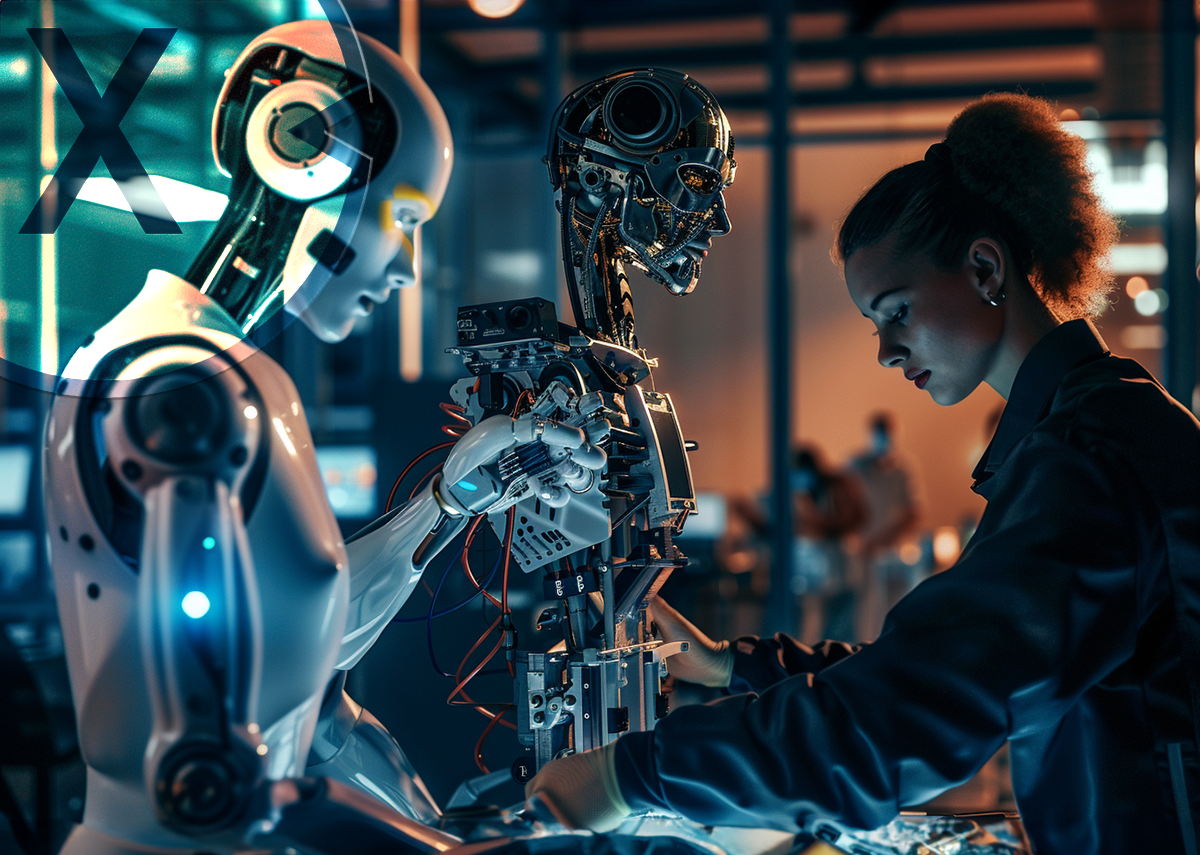
The success of a robotics project depends on the collaboration of robotics and artificial intelligence (AI) specialists - Image: Xpert.Digital
🤖✨ The importance of collaboration in robotics
🤖🔧 Specialized roles in robotics
In the field of robotics, there are a variety of specialized roles, all interconnected to develop complex systems that can be used in a wide variety of applications. Collaboration between these different roles is critical to the success of a robotics project. The AI Tooling Engineer develops the foundations for the robot's AI, while the Distributed Systems Engineer ensures that the various components work together effectively.
🌍🧭 Design and orientation
The Humanoid Robot Operator Interface Engineer designs the user interface through which people interact with the robot, and the Localization and Mapping Software Engineer develops the software that enables the robot to orient itself in its environment. At the same time, the Robot Behavior Coordination Engineer works to control the robot's behavior in real time, while the Robot Manipulation Engineer ensures that the robot can physically interact with its environment.
🧩🤝 Validation and autonomy
The Robot Simulation Engineer plays an important role in validating the developments in a simulated environment before testing them in the real world. Finally, the Software Engineer, Autonomy Platform and Teleop Software Engineer ensure that the robot can act both autonomously and remotely. Through the close collaboration of these engineers, a robot becomes a functional and autonomous system that can perform complex tasks in a variety of environments. Through its specialization, each of these roles contributes to ensuring that the robot works reliably and efficiently and is tailored to the requirements of its specific areas of application.
🎛️ 1. AI Tooling Engineer
An AI Tooling Engineer is responsible for developing and maintaining tools that support artificial intelligence (AI). These tools facilitate the creation, training and implementation of AI models that are essential for robots to understand and act on their environment. The AI tooling engineer therefore develops the software environments that enable the robots to learn from data and make intelligent decisions.
🌐 2. Distributed Systems Engineer
The distributed systems engineer plays a central role in the development of distributed systems that allow multiple computers to work together to complete a task more efficiently. In robotics, this often means that various sensors, actuators and other hardware components must communicate with each other in real time to ensure coherent action from the robot. These engineers ensure that these systems are reliable and scalable, which is particularly important in scenarios with many interconnected robots.
🕹️ 3. Humanoid Robot Operator Interface Engineer
The Humanoid Robot Operator Interface Engineer focuses on the interfaces used by humans to control and interact with humanoid robots. This role is crucial to ensure that the user interfaces are intuitive and user-friendly so that the operator can control the robot efficiently and precisely. This often involves bridging the gap between the complex technology inside the robot and the needs of the user.
🗺️ 4. Localization and Mapping Software Engineer
A Localization and Mapping Software Engineer is responsible for developing the software that helps a robot determine its position in an unknown environment and map that environment. These technologies are crucial for autonomous robots that need to move without human intervention. The engineer is working to develop algorithms that allow the robot to process environmental data from sensors such as cameras or LiDAR and convert it into an accurate map of the environment.
⚙️ 5. Robot Behavior Coordination Engineer
The Robot Behavior Coordination Engineer develops the systems that coordinate a robot's behavior. This means that this engineer creates the software that determines how the robot reacts to certain events. For example, this could include coordinating different movements to perform a task such as grasping an object. This role is particularly important in complex environments where the robot must handle many different tasks at the same time.
🖐️ 6. Robot Manipulation Engineer
The Robot Manipulation Engineer specializes in developing the systems that enable a robot to manipulate, i.e. grab, move and use, physical objects. This role is crucial for applications where robots must be able to interact with their physical environment, such as in manufacturing or logistics. The Manipulation Engineer ensures that the robot can work precisely and safely by analyzing and optimizing movement sequences and forces.
🎮 7. Robot Simulation Engineer
A Robot Simulation Engineer develops simulation environments in which robots can be tested before they are deployed in the real world. These simulations are essential to understand and optimize the robot's behavior under different conditions. The work of the Robot Simulation Engineer allows engineers to identify and correct problems before the robot is integrated into a real environment, saving time and costs.
🤖 8. Software Engineer, Autonomy Platform
The Software Engineer, Autonomy Platform focuses on developing software platforms that enable robots to act autonomously. These platforms integrate various subsystems such as perception, decision-making and movement control to ensure seamless autonomy. The Software Engineer works closely with other engineers to ensure the platform is reliable, scalable and can be used in a variety of applications.
📡 9. Teleop Software Engineer
The Teleop Software Engineer develops the software used for remote control of robots. This role is crucial in situations where a robot must operate in a dangerous or inaccessible environment but direct human control is required. The Teleop Software Engineer ensures that the communication between the operator and the robot is fast and reliable to carry out precise operations.
📣 Similar topics
- 🤖 Collaboration in robotics
- 🛠️ Specialized roles of the future in robotics
- 🚀 Advanced robotics technologies
- 🤝 The role of AI in the robotics project
- 🧑💻 Successful distribution of tasks in robotics teams
- 🤖 Humanoid interactions and controls
- 📍 Autonomous navigation and orientation in robotics
- 🎛️ Robot behavior and manipulation
- 🌐 Simulation developments and validations
- 👨🔧 Autonomy platforms and remote control
#️⃣ Hashtags: #Robotics #AI #Autonomy #Simulation #Engineer
We are there for you - advice - planning - implementation - project management
☑️ Industry expert, here with his own Xpert.Digital industry hub with over 2,500 specialist articles
I would be happy to serve as your personal advisor.
You can contact me by filling out the contact form below or simply call me on +49 89 89 674 804 (Munich) .
I'm looking forward to our joint project.
Xpert.Digital - Konrad Wolfenstein
Xpert.Digital is a hub for industry with a focus on digitalization, mechanical engineering, logistics/intralogistics and photovoltaics.
With our 360° business development solution, we support well-known companies from new business to after sales.
Market intelligence, smarketing, marketing automation, content development, PR, mail campaigns, personalized social media and lead nurturing are part of our digital tools.
You can find out more at: www.xpert.digital - www.xpert.solar - www.xpert.plus

